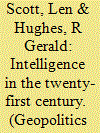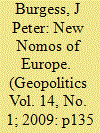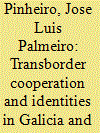|
|
|
Sort Order |
|
|
|
Items / Page
|
|
|
|
|
|
|
| Srl | Item |
| 1 |
ID:
087531


|
|
|
|
|
| Publication |
2009.
|
| Summary/Abstract |
This article outlines and explores some recent changes that have taken place in the practice and organization of western intelligence. American concern with organizational reform of its intelligence community is outlined and contrasted. Other transatlantic comparisons are made, in particular concerning debates about intelligence and human rights. The legacy of British experience in Northern Ireland for attitudes to torture and preservation of the rule of law is examined. The British experience of 'talking to terrorists' is also explored. Prospects for, and expectations of, the future, including the likelihood of catastrophic terrorism are discussed. The argument is made that the 'War on Terror' is a 'battle of ideas' and values.
|
|
|
|
|
|
|
|
|
|
|
|
|
|
|
|
| 2 |
ID:
087530


|
|
|
|
|
| Publication |
2009.
|
| Summary/Abstract |
According to Carl Schmitt, in his late work The Nomos of the Earth, published in 1950, the long evolution in the relation between humans and the earth has been decisive for the nature of traditional legal order. The historical links to European international jurisprudence (ius publicum Europaeum) have decayed with the old world order that supported them. Territoriality, once the foundation of the nation-state has evolved, causing a parallel change in the nation-state paradigm of sovereignty and the fabric of international law which has its basis in that paradigm. If Schmitt is correct in his prognoses about the end of a global era and the rise of a new yet uncharted world order in the mid-1940s, then the architects of the nascent European Coal and Steel Community face the same conditions, and must carry out their work with the same cultural, social and juridical raw materials, against the backdrop of the same concrete historical experience. This article will attempt to continue the trajectory of Schmitt's historical analysis of the ius publicum Europeaum, suggesting how its central concepts and theses map onto the grand geopolitical and civilisational project of European construction from 1950 to 2004 and beyond. It will explore the applicability of the concept of nomos for the nature of EU evolution, and interpret general elements of the European legal system in terms of the concept of nomos.
|
|
|
|
|
|
|
|
|
|
|
|
|
|
|
|
| 3 |
ID:
087525


|
|
|
|
|
| Publication |
2009.
|
| Summary/Abstract |
The global competition between states for position in the uncertain future of the life sciences brings a new dynamic to the intersection between geopolitics and the global knowledge economy. Armed with distinctive approaches to innovation in new health technologies, the emerging economies of China and India are determined to challenge the traditional hegemony of the developed countries in areas such as regenerative medicine where the promised biotechnology future is said to lie. Yet although the political belief that there is a future value for regenerative medicine is global, the precise nature of that future when measured in terms of the path of the science, the market demand, the cultural response, the commercialisation process and its associated business models is obscure. Drawing on theories of the competition and developmental state, I analyse the factors that shape a state's response to the promise of regenerative medicine, the strategies of 'speculative innovation' that may be adopted in pursuit of geopolitical advantage in this uncertain field, and the adaptive qualities necessary for a state's effective competition in an age of globalisation. This analysis is then applied to the emerging economies of China and India to assess their geopolitical strategies in regenerative medicine innovation, their current position in this part of the knowledge bioeconomy, and their likely impact on its continuing globalisation.
|
|
|
|
|
|
|
|
|
|
|
|
|
|
|
|
| 4 |
ID:
087526


|
|
|
|
|
| Publication |
2009.
|
| Summary/Abstract |
This article deals with the design and effects of state-centred strategies over a specific border area. Nationalist ideologies, culture, identity and persistence of historical facts are considered altogether in the case study of transborder relationships across a part of the Spanish-Portuguese boundary. Special attention is paid to political discourses and claims for recognition of transborder cultural feature and identity. As a matter of fact, the border's opening processes underwent in Europe and in other regional contexts around the world show clearly the permanence of nationalist and state-centred ways of understanding the world. Nationalism is reproduced by institutions and individuals through the consideration of cultural ties and differences across borders. Meanwhile, the globalising context in which we live makes necessary the assertion of multiple territorial and non-territorial identifications capable of overcoming the modern political framework based on states and boundaries.
|
|
|
|
|
|
|
|
|
|
|
|
|
|
|
|
| 5 |
ID:
087522


|
|
|
|
|
| Publication |
2009.
|
| Summary/Abstract |
From an offensive realist theoretical approach, this paper assumes that great powers are always looking for opportunities to attain more power in order to feel more secure. This outlook has led me to assert that the main objective of the US grand strategy in the twenty-first century is primacy or global hegemony. I have considered the US grand strategy as a combination of wartime and peacetime strategies and argued that the Caspian region and its hinterland, where I call the Eurasian Heartland, to use the term of Sir Halford Mackinder, has several geo-strategic dimensions beyond its wide-rich non-OPEC untapped hydro-carbon reserves, particularly in Kazakhstan. For my purposes, I have relied on both wartime strategy (US-led Iraq war) and peacetime strategy of supporting costly Baku-Tbilis-Ceyhan (BTC) to integrate regional untapped oil reserves, in particular Kazakh, into the US-controlled energy market to a great extent. This pipeline's contribution to the US grand strategy is assessed in relation to potential Eurasian challengers, Russia and China. The article concludes with an evaluation of the prospects of the US grand strategy in the twenty-first century.
|
|
|
|
|
|
|
|
|
|
|
|
|
|
|
|
| 6 |
ID:
087528


|
|
|
|
|
| Publication |
2009.
|
| Summary/Abstract |
Walls play an important role in the spatial configuration of cities. In addition to being one of the main factors or components in the configuration of spatial structure, a wall can also be assigned various intangible social meanings. Multiplicity of walls in many cases especially in partitioned or divided cities, have been studied by many scholars. Nicosia, the capital of the island of Cyprus can best be interpreted with the use of the words: walls, division, buffer zone, green line, destruction, and re-connection. The main aim of this paper is, first, to discuss and interpret the two walls (hard borders) of Nicosia - the historic walls and the buffer zone. Second, the role of these walls with respect to the issue of forming a border will be investigated throughout the partitioning process of the city. Additionally, the paper will try to identify the changing meaning and interpretation of these walls with respect to the two major ethnic communities, who are divided within the city.
|
|
|
|
|
|
|
|
|
|
|
|
|
|
|
|
|
|
|
|
|